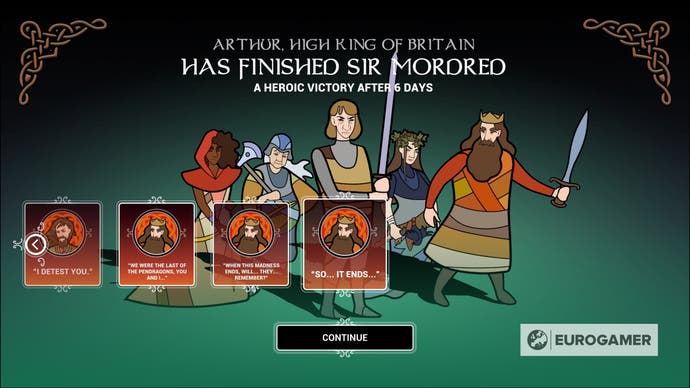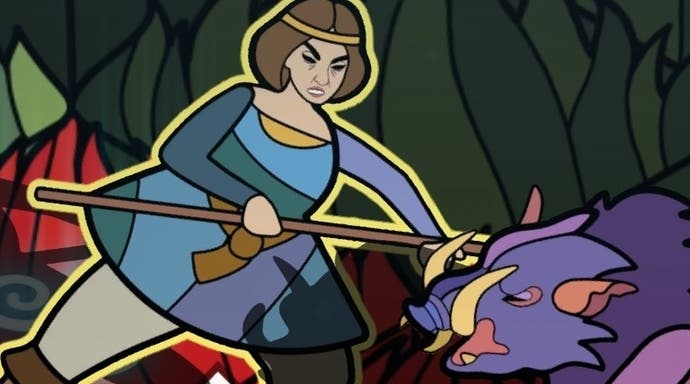Pendragon review - an Arthurian legend of its own
Gawain somewhere?
I only really understood Pendragon after I nearly lost it all. All the heroes I banked my hopes on had died. Lancelot, Morgana le Fey, Aonghas, Gawaine: all dead. How would I save King Arthur now? My story had fallen apart. But instead of giving up, I carried on.
And in doing so the story changed. It became about someone else, an unremarkable villager who survived through it all. Aida "the nervous lady", as the game called her. She made it to Arthur's side against great odds and although she didn't ultimately prevail against Mordred, Arthur's evil son, it didn't matter. It didn't matter because as her epilogue played out before me in a series of milestone events, I realised what truly mattered was the story I told.
Pendragon is the new game from inkle, the small studio behind 80 Days and Heaven's Vault and the Sorcery! adaptations - games which offer playful, nuanced spins on interactive fiction. Pendragon, in essence, is a roguelike in which you're riding to help King Arthur as he prepares for a climactic battle, and you play it on a series of tiled boards strung across a series of maps, each taking place in a different location and moving the narrative onwards.
You start by selecting a character from Arthurian legend to play as. Guinevere and Lancelot are available from the outset, and every hero has their own starting place and motivation for riding to Arthur's aid. Who you can choose to kick off with depends not on XP gained or shop upgrades, but on who you have met in previous playthroughs. Like the myths it builds on, Pendragon's stories get richer in the retelling.
There are two aspects to the flow of the game. One is the map, in which you plot your course across Britain as you hunt for Arthur's final battleground. The other are the scenarios (the tiled board games) that allow the story to unfold.
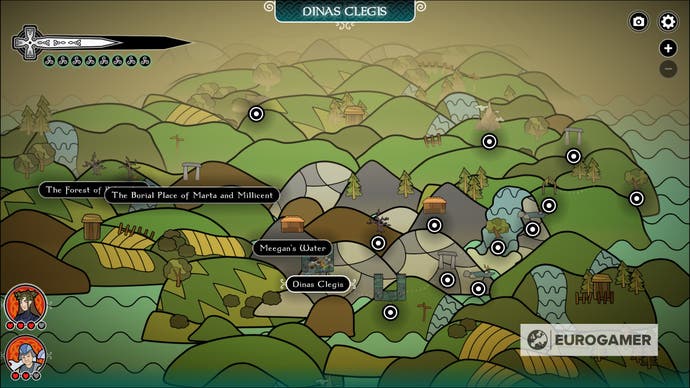
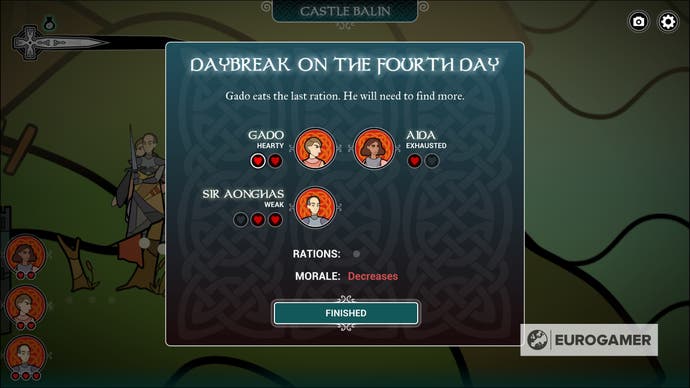
The map is for fundamental decisions: where to go next. Waypoints will appear as you adventure onwards and you will need to decide whether you want to go to keeps, villages, woods or ruins, each with their own possible pitfalls. Food is another consideration. Run out of rations and, when you sleep, you will lose morale and a heart of health.
The scenarios are about individual encounters. On the tiled boards, characters both friend and foe generally move one space at a time, either linearly (up, down, left, right) or diagonally, but they can only defeat another character while in linear mode - one piece sliding onto another's space. Characters can switch between linear and diagonal modes, but doing so takes a turn, which is important because a lot can happen in a turn. Winning a scenario involves either clearing a board of enemies or getting to an end-tile on the other side. It's chess, but it's also American Football.
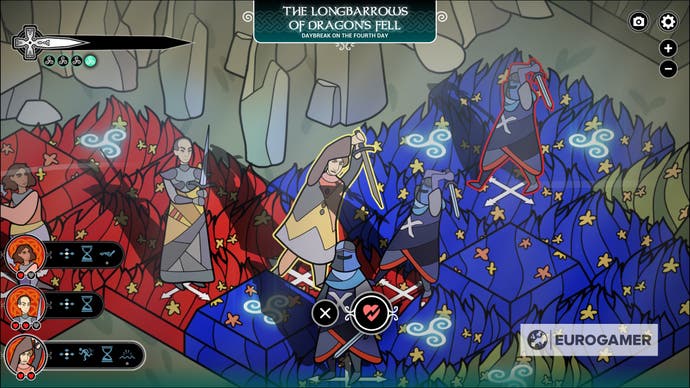
That is Pendragon at its simplest, but there are additional layers that complicate it. There are raised tiles which allow you to move off of them in either mode, which is powerful, and there are different characters with different abilities which alter the normal rhythm of things. It's also very important how you colour a board by walking across tiles, because your characters will move more freely, and be able to attack more aggressively, from your own colour. Morale is very important too.
Morale is important because there are occasions in Pendragon where you will not want to fight. This might be because you're talking to a potential ally and are waiting for dialogue to unfold, turn by turn, or because you're in a tactical deadlock and don't want to give any ground. One wrong move can be devastating in Pendragon. There's always a chance the enemy's collective nerve will buckle and they flee, but then again, so might yours. It's morale that governs this. It's a kind of timer which depletes the longer you're in play. Let it drop too low you will be forced to flee, leaving any downed allies to die, and forfeiting any choice over what scenario you will end up in next.
I hope you're beginning to see that Pendragon is more than it initially seems to be. I remember my misplaced concern after I reached the end of it on my first go. I was Guinevere and it took me about an hour, probably less, to get to Arthur. I didn't defeat Mordred but I remember thinking, 'Was that it?'
Was that it? Theoretically, I'd reached the end, but to suggest I had appreciated everything Pendragon had to offer would be absurd. The beauty of Pendragon comes out in the learning. Now when I look at a scenario I see so much more. I see tactics in play, I see weaknesses and opportunities and danger. But all this I had to slowly learn on subsequent playthroughs. It's not the new things you acquire with each run, but actual knowledge and skill you start to pick up. It's why I'm being deliberately vague about how things work now because I want you to figure them out for yourself. That is the game.
Mordred turned out to be a great leveller. Yes you can reach him within an hour, but it would go on to take me 10 more before I defeated him, and that wasn't on the game's harder difficulties. And in the cycle of trying again and again, I discovered storytelling.
Again, to begin with, storytelling seemed bizarrely absent, given inkle's other story-rich games. There was the bolted-down story of Arthur facing Mordred, but I didn't seem to have much effect on it. All I seemed to be doing was going along with it. Characters would say things, and there was some scene setting and light narration, but to me it all looked like fluff and flavour. Bit by bit, though, it began piling up.
Pendragon is clever. And it's clever with thrift. Characters only seem to tell you important information and never in more than a sentence or two, and yet, within those boundaries, a lot can be delivered. "Damnit Arthur, I wish I'd never met you," says Sir Gawaine to himself. Then, "With your justice and your peace and your happy little laugh." So much evoked with so little.
It's the same with narration. It's not always there but occasionally it pops up to accentuate a scene. You can trigger it simply by moving. I moved Gawaine against a wolf and an invisible narrator told me: "A second spectral wolf paces forward... Unaware that it has emerged into Sir Gawaine's path..." Then, when I moved Aonghas: "Sir Aonghas moved like the seasons, like the tide. Nothing could turn him aside." It's like having a personal poet.
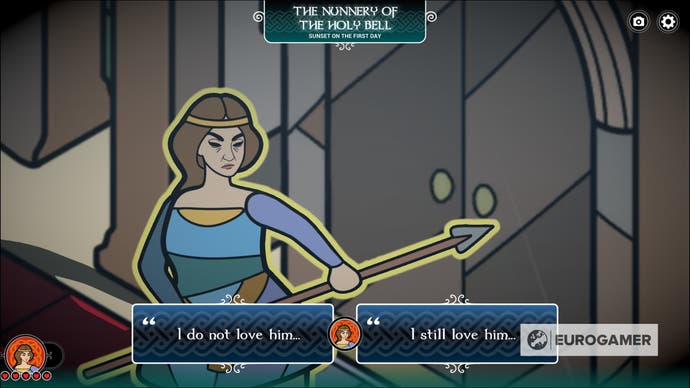
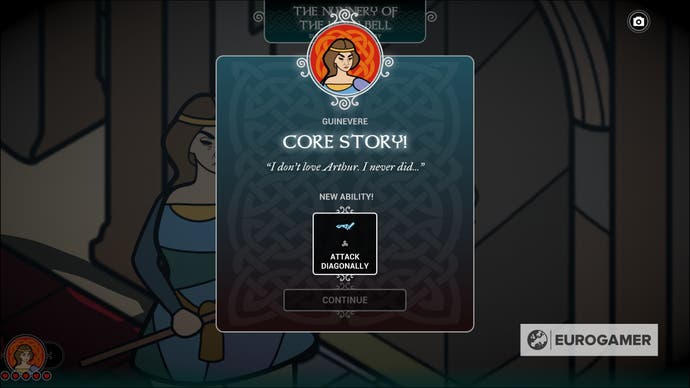
Cleverer still is how Pendragon uses story and dialogue to govern character abilities. A box will appear at a poignant moment with a big "Story Changed!" or "Core Story!" alert and usually a choice of special ability for the character. Does Guinevere love Arthur? Her answer will dictate her ability. Or take my heroic villager Aida: she got an ability because, and I quote, "I went to the edge... but I survived!" Yes, she most certainly did.
In fact, one of the most failsafe and interesting ways to shake the story up, and alter the narrative bonds between characters, is by nearly dying - lucky, really, given how punishing Pendragon can be. Should one character save another from death, they'll almost certainly see one another in a different light afterwards, and maybe you'll benefit mechanically too. And you'll never care more about a character than when their staying alive is the only thing between you and defeat, let me tell you.
I think this is the game's way of saying, "Hey don't worry about a perfect run. Enjoy the twists and turns. We'll write a more interesting story around you because of it." And everything I've seen seems to bear this out: the way a new knight will suddenly appear to join you when you're about to give up; the way a villager like Aida can fly into a rage and save you in the most dire of situations. Everywhere the invisible hand of inkle, nudging the story in an interesting way.
I haven't even talked about the beautiful stained glass appearance or the wonderful way Britain is condensed into camel-like humpy hills. Nor have I mentioned the gorgeous musical score or the powerful restraint with which it underscores a scene, like how an enemy will appear accompanied by the foreboding sound of a single, low, piano note, echoing the change in mood.
Pendragon seems to reveal its mechanics in a glance or two, but this is actually a game to be learned slowly, a story that grows richer over time and retelling. The tiled maps and the spare text are merely the surface of it, and every layer deeper you descend is a delight.
